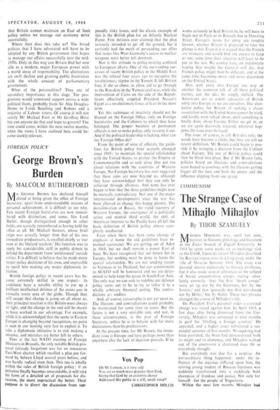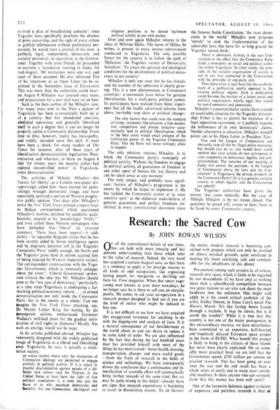The Strange Case of Mihajlo Mihajlov
COMMUNISM
By TIBOR SZAMUELY
On President Tito's personal order a criminal charge was raised against him. In April 1965, a few days after being dismissed from the Uni- versity, Mihajlov was sentenced to nine months in gaol for 'libelling a foreign country.' He appealed, and a higher court substituted a sus- pended sentence of five months. Wrongdoing had been punished, the State had demonstrated both its might and its clemency, and Mihajlov walked out of the courtroom a chaStened man. Or so everybody thought.
But everybody was due for a surprise. An extraordinary thing happened : under the in- fluence of the injustice inflicted upon him, the retiring young student of Russian literature was suddenly transformed into a recklessly bold champion of freedom and justice. Not only for himself—for the people of Yugoslavia.
Within the next few months Mihajlov had
evolved a plan of breathtaking audacity : since Yugoslav laws specifically proclaim the absence of press censorship, and the right of every citizen to publish information without preliminary per- mission, he would start a journal of his own—a perfectly legal, independent, democratic and socialist periodical, in opposition to the Govern- ment. Together with some friends, he proceeded to convene a foundation meeting in Zadar for mid-August; 300 invitations were sent out, and most of them accepted. He also informed Tito of his intentions in an Open Letter (to be re- printed in the September issue of Encounter). This was more than the authorities could bear: on August 8 Mihajlov was arrested once more, and preparations for a new trial were set on foot. Such is the bare outline of the Mihajlov case. For many years now in the West a picture of Yugoslavia has been systematically built up as of a country that has abandoned coercion, abolished repression, and generally liberalised itself to such a degree that it can no longer be properly called a Communist dictatorship. From time to time, however, reality has inescapably, and rudely, intruded upon this idyll. It must have been a shock, for many readers of The Times for instance, after all these years of liberalisation, democratisation, legalisation, West- ernisation and what-not, to learn on August 6 that 'for twenty years the security police had enjoyed uncontrolled power' in Yugoslavia. Some democratisation!
The activities of Mihajlo Mihajlov—this 'fanatic for liberty', as a London newspaper dis- approvingly called him—have marred the pains- takingly wrought democratic image, and have apparently annoyed a section of Western progres- sive public opinion. Two days after Mihajlov's arrest the New York Times printed a report from its Balkan correspondent which questioned Mihajlov's motives, doubted his academic quali- fications, sneered at his 'pseudo-legal "briefs,"' and even called those Western newspapers who have defended him—liberal' (in inverted commas). 'There have been reports'—it adds darkly—'in reputable Belgrade circles that he has been secretly aided by Soviet intelligence agents and by dogmatic elements still in the Yugoslav Communist Party' (oddly enough, the Soviet and the Yugoslav press have in unison accused him of being inspired by Western imperialist circles). The correspondent commiserates with the Yugo- slav Government, which is 'extremely unhappy about the event': 'Liberal Government spokes- men criticise the idea that Mr. Mihajlov should pose as the "test case of democracy," particularly at a time when Yugoslavia is undergoing a far- reaching political-economic reform ... to extend democratisation not only inside the Communist Party, but in the society as a whole.' Can one imagine the New York Times attacking, say, Dr Martin Luther King for having, by his intemperate actions, embarrassed Governor Wallace's well-laid plans for the gradual intro- duction of civil rights in Alabama? Hardly. Yet such an analogy would not be inapt.
In his articles published abroad, Mihajlov has vehemently disagreed with the widely publicised image of Yugoslavia as a liberal and liberalising date. Yugoslavia, he says, is actually a totali- tarian society,
an unjust society where only the champions of Communist ideology are permitted to engage publicly in political activity. If it is unjust to practise discrimination against people of a dif- ferent skin colour—and the Negroes in the United States at least have the right of free political association—it is even less just for those of us who maintain democratic and Socialist. but not Communist, ideological and
religious positions to be denied legitimate political activity in our own society.
Over and over again Mihajlov returns to the ideas of Milovan Djilas. The name of Djilas, he writes, is present in every serious conversation conducted in Yugoslavia. The only possible future for the country is to follow the path of 'Djilasism,' the Yugoslav variety of Democratic Socialism: `To create the spiritual and ideological conditions for the development of political demo- cracy in our country.'
Mihajlov is only one man, but he has friends, and the number of his adherents is clearly grow- ing. This is a new phenomenon in Communist countries: a movement from below for genuine liberalisation, for a multi-party political system. Its participants have realised from bitter experi- ence that all the loudly advertised reforms from above inevitably stop short at political change: The only factors that could raise the standard of living—economic liberalisation, a free market, free competition and private initiative—auto- matically lead to political liberalisation, which in the final count would entail collapse of the totalitarian power of the Yugoslav Communist Party. This the Party will never willingly allow to happen.
The only solution, reasons Mihajlov, is to break the Communist party's monopoly of political activity. Without the freedom to engage in political activity all guarantees of freedom in any other apect of human life 'are illusory and can be taken away at any moment.'
The truly unique, and probably most signifi- cant, feature of Mihajlov's programme is the means by which he hopes to implement it. He has tackled the Communist system at its most sensitive spot: at the elaborate make-believe of genuine guarantees and perfect freedoms en- shrined in every constitutional document since
the famous Stalin Constitution, 'the most demo- cratic in the world.' Mihajlov now proposes 'merely' to seek the implementation of the admirable laws that have for so long graced the Yugoslav statute book: There is absolutely nothing in the new Con- stitution to the effect that the Communist Party holds a monopoly on social and political activi- ties within Yugoslavia. In other words, the prin- ciple of the socialist organisation of society is not in any way connected in the Constitution with the principle of one-party rule.
Thus there exists a legal basis for the establish- ment of a publication openly opposed to the existing political regime. Such a publication could become the nucleus of a future social and political organisation, wholly legal, that would be non-Communist and democratic.
Mihajlov's constitutionalist tactics have created an unenviable situation for the Yugoslav dictator- ship. Either it has to permit the existence of a
legal opposition movement, or it publicly exposes
the hollowness of its own 'democratic' claims.
Neither alternative is attractive. Mihajlov himself
points out in his Open Letter to President Tito:
You and the League of Communists can obviously stop all this by illegal police measures, but should you do so, you would show world opinion that your actions do not correspond to your statements on democracy, legality and con- stitutionalism. The outcome of our meeting at Zadar will answer the question: is the League of Communists above the laws and the Con- stitution? Is Yugoslavia the private property of the Communist Party? Or is it a genuine socialist country in which legality and the -Constitution are upheld?
The Yugoslav authorities have given the answer that came naturally. But the case of Mihajlo Mihajlov is by no means closed. The questions he posed will, sooner or later, have to be faced by every Communist country.































 Previous page
Previous page